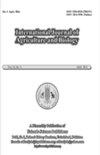{"title":"放牧绵羊胃肠道寄生虫病和植物矿物质的相关性","authors":"H. Rizwan","doi":"10.17957/ijab/15.1809","DOIUrl":null,"url":null,"abstract":"Trace elements play an important role to boost the immunity and fight against parasitic infections. Concentration of trace elements like Copper (Cu), Cobalt (Co), Manganese (Mn) and Zinc (Zn) were determined in soil, forages and sera of sheep. An associative analysis was also made between the burden of Gastrointestinal (GI) parasites and concentrations of trace elements of sheep sera. For this, 384 faecal and blood samples of sheep, an appropriate number of forages and soil samples were collected. The faecal samples were subjected to determine the species and burden of GI parasites. The sera, plant and soil samples were subjected to pre-treatment (digestion) required for the determination of trace elements. The overall prevalence of GI parasites was 32.81% and the most prevalent species were Haemonchus (H.) contortus followed in order by Eimeria spp., Strongyloides spp., Trichostrongylus spp. and Fasciola spp. Variables like age, sex, breed and tehsils of Silakot district showed an insignificant association with GI parasitic burden. Trace elements concentration of forages showed a significant (P < 0.05) variation while trace elements concentration of soil showed an insignificant (P > 0.05) variation. In serum, Zn concentration showed significant (P < 0.05) results among all the tehsils of study district. Mean concentrations of Mn and Cu in serum were found inversely proportional to the mean egg count per gram of sheep faeces in tehsil Pasroor of the Sialkot district. Forages containing high concentrations of Mn and Cu can be used effectively against GI parasites. © 2021 Friends Science Publishers","PeriodicalId":13769,"journal":{"name":"International Journal of Agriculture and Biology","volume":null,"pages":null},"PeriodicalIF":0.0000,"publicationDate":"2021-07-01","publicationTypes":"Journal Article","fieldsOfStudy":null,"isOpenAccess":false,"openAccessPdf":"","citationCount":"0","resultStr":"{\"title\":\"Correlation of the Gastrointestinal Parasitism with the Phytominerals in the Grazing Sheep (Ovis aries)\",\"authors\":\"H. Rizwan\",\"doi\":\"10.17957/ijab/15.1809\",\"DOIUrl\":null,\"url\":null,\"abstract\":\"Trace elements play an important role to boost the immunity and fight against parasitic infections. Concentration of trace elements like Copper (Cu), Cobalt (Co), Manganese (Mn) and Zinc (Zn) were determined in soil, forages and sera of sheep. An associative analysis was also made between the burden of Gastrointestinal (GI) parasites and concentrations of trace elements of sheep sera. For this, 384 faecal and blood samples of sheep, an appropriate number of forages and soil samples were collected. The faecal samples were subjected to determine the species and burden of GI parasites. The sera, plant and soil samples were subjected to pre-treatment (digestion) required for the determination of trace elements. The overall prevalence of GI parasites was 32.81% and the most prevalent species were Haemonchus (H.) contortus followed in order by Eimeria spp., Strongyloides spp., Trichostrongylus spp. and Fasciola spp. Variables like age, sex, breed and tehsils of Silakot district showed an insignificant association with GI parasitic burden. Trace elements concentration of forages showed a significant (P < 0.05) variation while trace elements concentration of soil showed an insignificant (P > 0.05) variation. In serum, Zn concentration showed significant (P < 0.05) results among all the tehsils of study district. Mean concentrations of Mn and Cu in serum were found inversely proportional to the mean egg count per gram of sheep faeces in tehsil Pasroor of the Sialkot district. Forages containing high concentrations of Mn and Cu can be used effectively against GI parasites. © 2021 Friends Science Publishers\",\"PeriodicalId\":13769,\"journal\":{\"name\":\"International Journal of Agriculture and Biology\",\"volume\":null,\"pages\":null},\"PeriodicalIF\":0.0000,\"publicationDate\":\"2021-07-01\",\"publicationTypes\":\"Journal Article\",\"fieldsOfStudy\":null,\"isOpenAccess\":false,\"openAccessPdf\":\"\",\"citationCount\":\"0\",\"resultStr\":null,\"platform\":\"Semanticscholar\",\"paperid\":null,\"PeriodicalName\":\"International Journal of Agriculture and Biology\",\"FirstCategoryId\":\"1085\",\"ListUrlMain\":\"https://doi.org/10.17957/ijab/15.1809\",\"RegionNum\":0,\"RegionCategory\":null,\"ArticlePicture\":[],\"TitleCN\":null,\"AbstractTextCN\":null,\"PMCID\":null,\"EPubDate\":\"\",\"PubModel\":\"\",\"JCR\":\"Q2\",\"JCRName\":\"Agricultural and Biological Sciences\",\"Score\":null,\"Total\":0}","platform":"Semanticscholar","paperid":null,"PeriodicalName":"International Journal of Agriculture and Biology","FirstCategoryId":"1085","ListUrlMain":"https://doi.org/10.17957/ijab/15.1809","RegionNum":0,"RegionCategory":null,"ArticlePicture":[],"TitleCN":null,"AbstractTextCN":null,"PMCID":null,"EPubDate":"","PubModel":"","JCR":"Q2","JCRName":"Agricultural and Biological Sciences","Score":null,"Total":0}
引用次数: 0
Correlation of the Gastrointestinal Parasitism with the Phytominerals in the Grazing Sheep (Ovis aries)
Trace elements play an important role to boost the immunity and fight against parasitic infections. Concentration of trace elements like Copper (Cu), Cobalt (Co), Manganese (Mn) and Zinc (Zn) were determined in soil, forages and sera of sheep. An associative analysis was also made between the burden of Gastrointestinal (GI) parasites and concentrations of trace elements of sheep sera. For this, 384 faecal and blood samples of sheep, an appropriate number of forages and soil samples were collected. The faecal samples were subjected to determine the species and burden of GI parasites. The sera, plant and soil samples were subjected to pre-treatment (digestion) required for the determination of trace elements. The overall prevalence of GI parasites was 32.81% and the most prevalent species were Haemonchus (H.) contortus followed in order by Eimeria spp., Strongyloides spp., Trichostrongylus spp. and Fasciola spp. Variables like age, sex, breed and tehsils of Silakot district showed an insignificant association with GI parasitic burden. Trace elements concentration of forages showed a significant (P < 0.05) variation while trace elements concentration of soil showed an insignificant (P > 0.05) variation. In serum, Zn concentration showed significant (P < 0.05) results among all the tehsils of study district. Mean concentrations of Mn and Cu in serum were found inversely proportional to the mean egg count per gram of sheep faeces in tehsil Pasroor of the Sialkot district. Forages containing high concentrations of Mn and Cu can be used effectively against GI parasites. © 2021 Friends Science Publishers


